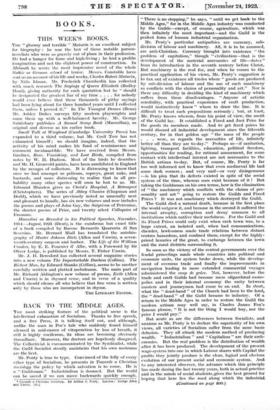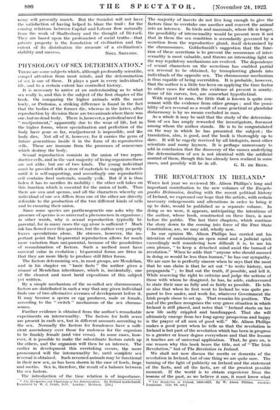BACK TO THE MIDDLE AGES.
THE most striking feature of the political scene is the intellectual exhaustion of Socialism. Thanks to free speech, and a free Press, it is talking itself out, and although, unlike the man in Poe's tale who suddenly found himself silenced in mid-career of vituperation by loss of breath, it still is highly vociferous, its ideas arc becoming obviously threadbare. Moreover, the doctors are hopelessly disagreed. The Collectivist is excommunicated by the Syndicalist, while the 'Guild Socialist stoutly maintains that his own nostrums arc the best.
Mr. Penty is true to type. Convinced of the folly of every other type of Socialism, he presents in Towards a Christian Sociology the policy by which salvation is to come. He is a " Guildsman." Industrialism is doomed. But the world can be saved if we can move backwards quickly enough.
• Towards a Christian Sociology. By Arthur J. Penty. London: George Allen and Unwin. Les.1
" There is no stopping," he says, " until we get back to the Middle Ages," for in the Middle Ages industry was conducted by the Guilds—except, of course, agriculture, which was then infinitely the most important—and the Guild is the perfect form of human industrial organization.
Mr. Penty's particular antipathies are currency, sub. division of labour and machinery. All, it is to be assumed, are anti-Christian. Currency brought into existence " the problem of capitalism," though " civilization—that is the development of the material accessories of life—dates" from its introduction in the seventh century before Christ. But machinery is the real foe, and when he comes to the practical application of his views, Mr. Penty's suggestion is to tax out of existence all trades where " goods are produced by sub-division of labour and the use of such machinery as conflicts with the claims of personality and art." Nor is there any difficulty in deciding the kind of machinery which suffers from these disadvantages. " Anyone of artistic sensibility, with practical experience of craft production, would instinctively know " where to draw the line. It is difficult to treat such propositions seriously ; but, at least, Mr. Penty knows wherein, from his point of view,. the merit of the Guild lay. It established a Fixed and Just Price for the goods its members made. And to get fixed prices he would discard all industrial development since the fifteenth century, for -in that golden age ".the mass of the people
. . were, as regards the necessities of life, infinitely better off than they are to-day." Perhaps so—if sanitation, lighting, transport facilities, education,. political freedom, opportunities' for reading, for rational amusement, for some contact with intellectual interest are not necessaries to the British artisan to-day. But, of course, Mr. Penty is far too well informed not to know that even mediaeval life had some dark corners ; and very naif—or very disingenuous —is his plea that its defects existed in spite of the social system of the time, whereas ours exist because of it ! But taking the Guildsman on his own terms, how is the elimination of " the machinery which conflicts with the claims of per- sonality and art " going to restore the Guilds and Fixed Prices ? It was not machinery which destroyed the Guild.
The Guild died a natural death, because in the first place the world outgrew it, and because in the second it suffered the internal atrophy, corruption and decay common to all institutions which outlive their usefulness. For the Guild and its Fixed Prices could only exist when each town was, to a large extent, an isolated unit, when bad communications, disorder, lawlessness made trade relations between distant centres hazardous, and confined them, except for the highly- priced luxuries of the great, to exchange between the town and the rural districts surrounding it.
So soon as the victory of the central governments over the feudal princelings made whole countries into political and economic units, the system broke down, while the develop- ment of overseas trade and finally the improvements in navigation leading to more extended commercial voyages administered the coup de grlice. Not, however, before the trade and craft Guilds had become mere oligarchical mono- polies and in their internal economy the unity between masters and journeymen had come to an end. In short, what the " dead-hand " of the Church had been to the land, the " dead-hand " of the Guild became to industry. Of a return to the Middle Ages in order to restore the Guild the modern artisan may well say, in Charles James Fox's famous phrase, " It is not the thing I would buy, nor the price I would pay."
But acute as are the differences between Socialists, and anxious as Mr. Penty is to declare the superiority of his own views, all varieties of Socialism suffer from the same basic delusion. They all attack the modern method of producing wealth. " Industrialism " and " Capitalism " are their arch- enemies. But the real problem is the distribution of wealth after it has been produced. The development of the present wage-system into one in which Labour shares with Capital the profits they jointly produce is the clear, logical and obvious evolution of our present social and economic system. And to any interested observer, the advance which this principle has made during the last twenty years, both in actual practice and in the minds of social students,gives the best ground for hoping that here lies the road along which the industrial:
(Continued on page 800.) army will presently march. But the Socialist will not have the satisfaction of having helped to blaze the trail : for the coming relations between Capital and Labour flow naturally from the work of Shaftesbury and the thought of Difrieli. They are based upon the profoundest of social truths—that private property is the foundation of civilization and the extent of its distribution the measure of a civilization's



















































 Previous page
Previous page